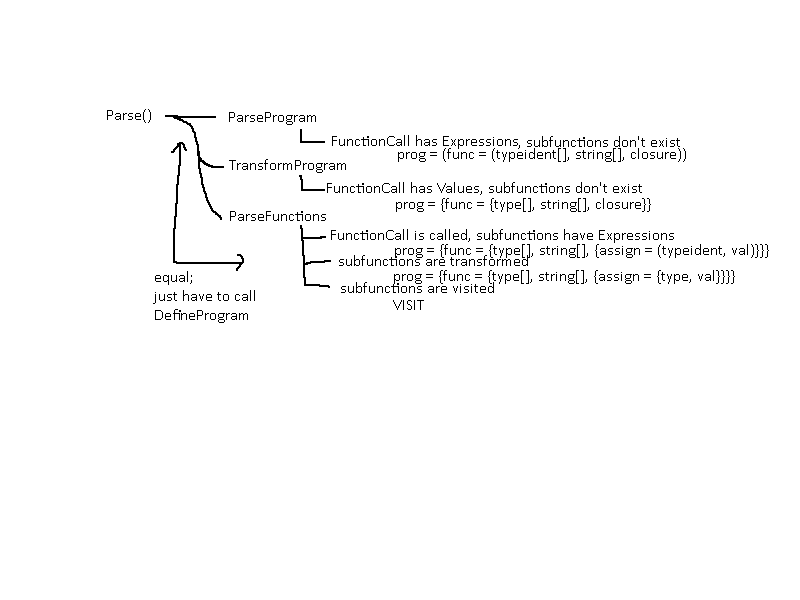Published by Jady on 5/23/24, 11:36 PM
I've narrowed down all the syntax definitions to just a few lines of really flexible code:
IToken fieldToken = new TokenString([new ParameterValueToken("fieldTypes"), new ParameterValueToken("fieldNames")]);
IToken parameterToken = new TokenString([new ParameterValueToken("parameterTypes"), new ParameterValueToken("parameterNames")]);
IToken varArgParameterToken = new TokenString([new ParameterValueToken("varArgParameterType"), new LiteralToken("..."), new ParameterValueToken("varArgParameterName")]);
AddFunction(ContextType.Program, Functions.Program, 100, new TokenSplit(new PassToken(), new LiteralToken(";"), new EOFToken(), new ParameterExpressionToken("statements")));
AddFunction(ContextType.Program, Functions.Struct, 90, new TokenString([new ParameterValueToken("name"), new TokenSplit(new LiteralToken("{"), new LiteralToken(";"), new LiteralToken("}"), new TokenOptions([fieldToken, new ParameterExpressionToken("functions")]))]));
AddFunction(ContextType.Program, Functions.Function, 80, new TokenString([new ParameterValueToken("returnType"), new ParameterValueToken("name"), new TokenSplit(new LiteralToken("("), new LiteralToken(","), new LiteralToken(")"), new TokenOptions([parameterToken, varArgParameterToken])), new TokenOptional(new TokenSplit(new LiteralToken("{"), new LiteralToken(";"), new LiteralToken("}"), new ParameterExpressionToken("statements")))]));
AddFunction(ContextType.Function, Functions.Declare, 100, new TokenString([new LiteralToken("Declare"), new ParameterValueToken("type"), new ParameterValueToken("name")]));
AddFunction(ContextType.Function, Functions.Define, 100, new TokenString([new ParameterValueToken("type"), new ParameterValueToken("name"), new LiteralToken("="), new ParameterExpressionToken("value")]));
AddFunction(ContextType.Function, Functions.Assign, 100, new TokenString([new ParameterExpressionToken("target"), new LiteralToken("="), new ParameterExpressionToken("value")]));
AddFunction(ContextType.Function, Functions.Return, 100, new TokenString([new LiteralToken("Return"), new TokenOptional(new ParameterExpressionToken("value"))]));
AddFunction(ContextType.Function, Functions.Add, 30, new TokenString([new ParameterExpressionToken("a"), new LiteralToken("+"), new ParameterExpressionToken("b")]));
AddFunction(ContextType.Function, Functions.LessThan, 40, new TokenString([new ParameterExpressionToken("a"), new LiteralToken("<"), new ParameterExpressionToken("b")]));
AddFunction(ContextType.Function, Functions.While, 100, new TokenString([new LiteralToken("While"), new LiteralToken("("), new ParameterExpressionToken("condition"), new LiteralToken(")"), new ParameterExpressionToken("body")]));
Published by Jady on 5/22/24, 10:57 PM
Here's a more in-depth diagram of how the compiler works, if you can understand stuff like regex:
// Source code
extern Void printf(String format, Int... values);
Foo
{
Int a;
Int b;
Foo New(Int a, Int b)
{
Declare Foo this;
this.a = a;
this.b = b;
Return this;
}
Int* A(Foo this)
{
Return this.a;
}
};
Void main()
{
Foo foo = Foo.New(2, 3);
printf("Starting at %i\n", foo.A());
While (foo.A() < 6)
{
foo.A() = foo.A() + 1;
printf("Loop %i\n", foo.A());
};
printf("Ending at %i\n", foo.A());
Return;
};
// Compiler first pass
// Mostly just grab all the type and function information
// Available functions
Parameter(String type, String name)
as "$type $name";
VarArgParameter(String type, String name)
as "$type... $name";
Body(Int index)
as "\{ $index=lexer.Index \}";
Function(String name, Parameter[] parameters, VarArgParameter? varArgParameter, String returnType, Body? body)
as "$returnType $name \(\) $body"
as "$returnType $name \( $varArgParameter (,)? \) $body"
as "$returnType $name \( $parameters (, $parameters)* (, $varArgParameter)? (,)? \) $body";
Field(String type, String name)
as "$type $name";
Struct(String name, Field[] fields, Function[] functions)
as "$name \{ ($fields | $functions)+ \}";
Program(Struct[] structs, Function[] functions)
as "($structs | $functions)+";
Program(
[
Struct("Foo", [Field("Int", "a"), Field("Int", "b")],
[
Function("New", [Parameter("Int", "a"), Parameter("Int", "b")], None, "Foo", Some(FOO.NEW BODY INDEX)),
Function("A", [Parameter("Foo", "this")], None, "Int*", Some(FOO.A BODY INDEX),
]),
],
[
Function("printf", [Parameter("String", "format")], Some(Parameter("Int", "values")), "Void", None),
Function("main", [], None, "Void", Some(MAIN BODY INDEX)),
]);
// Compiler second pass
// Generate any intermediary code needed to parse function bodies
// Available functions
Parameter(Type type, String name);
Body(Int index);
Function(String name, Parameter[] parameters, Parameter? varArgParameter, String returnType, Body? body);
Field(Type type, String name);
Struct(String name, Field[] fields, Function[] functions);
Program(Struct[] structs, Function[] functions);
Program(
[
Struct("Foo", [Field(Int, "a"), Field(Int, "b")],
[
Function("New", [Parameter(Int, "a"), Parameter(Int, "b")], None, Foo, Some(FOO.NEW BODY INDEX)),
Function("A", [Parameter(Foo, "this")], None, Int*, Some(FOO.A BODY INDEX),
Function("Get_a", [Parameter(Foo, "this")], None, Int*, None),
Function("Get_b", [Parameter(Foo, "this")], None, Int*, None),
]),
],
[
Function("printf", [Parameter(String, "format")], Some(Parameter(Int, "values")), Void, None),
Function("main", [], None, Void, Some(MAIN BODY INDEX)),
Function("Get_Foo.New", [Parameter(Type<Foo>, "type")], None, Foo.New, None),
Function("Get_Foo.A", [Parameter(Type<Foo>, "type")], None, Foo.A, None),
Function("Call_Foo.A", [Parameter(Foo, "this")], None, () => Foo.A(this), None),
]);
// Compiler third pass
// Now we get to the actual function definitions
// Available functions
/// Compiler functions
Define(Type type, String name, Value value)
as "$type $name = $value";
Declare(Type type, String name)
as "$type $name";
Assign(Value target, Value value)
as "$target = $value";
Return(Value? value)
as "Return $value?";
While(Expression condition, Expression body)
as "While ( $condition ) $body";
LessThan(Value left, Value right)
as "$left < $right";
Add(Value left, Value right)
as "$left + $right";
/// User functions
printf(String format, Value... values);
main();
/// Compiler-generated user functions
Foo.Get_a(Foo this)
as "$this.a";
Foo.Get_b(Foo this)
as "$this.b";
Get_Foo.New(Type type)
as "$type.New";
Get_Foo.A(Type type)
as "$type.A";
Call_Foo.A(Foo this)
as "$this.A";
Foo.New(Int a, Int b)
{
Declare(Foo, "this");
Assign(Foo.Get_a(this), a);
Assign(Foo.Get_b(this), b);
Return(Some(this));
}
Foo.A(Foo this)
{
Return(Foo.Get_a(this));
}
Main()
{
Define(Foo, "foo", Get_Foo.New(Foo)(2, 3));
printf("Starting at %i", Call_Foo.A(foo)());
While(LessThan(Call_Foo.A(foo)(), 6),
{
Assign(Call_Foo.A(foo)(), Add(Call_Foo.A(foo)(), 1));
printf("Loop %i", Call_Foo.A(foo)());
});
printf("Ending at %i", Call_Foo.A(foo));
Return(None);
}
Everything is functions. Even the functions.


